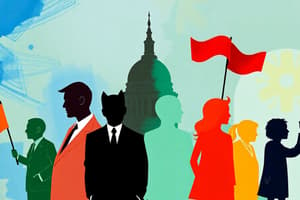Podcast
Questions and Answers
Which of the following accurately describes the difference between a treaty and an executive agreement?
Which of the following accurately describes the difference between a treaty and an executive agreement?
- A treaty is between the President and the House; an executive agreement is between the President and the Senate.
- A treaty is negotiated by the President and requires Senate ratification; an executive agreement does not. (correct)
- A treaty is permanent; an executive agreement is temporary.
- A treaty is a domestic policy initiative; an executive agreement focuses on foreign policy.
After the Vice President and the Speaker of the House, who is next in the line of succession to become President of the United States?
After the Vice President and the Speaker of the House, who is next in the line of succession to become President of the United States?
President Pro Tempore of the Senate
Impeachment means a president is automatically removed from office.
Impeachment means a president is automatically removed from office.
False (B)
What is the primary function of the President's Cabinet?
What is the primary function of the President's Cabinet?
What is the primary formal role of the Vice President of the United States?
What is the primary formal role of the Vice President of the United States?
What is a pocket veto?
What is a pocket veto?
What specific action did Dwight Eisenhower take in Little Rock, Arkansas in 1957, and what power did he utilize to do so?
What specific action did Dwight Eisenhower take in Little Rock, Arkansas in 1957, and what power did he utilize to do so?
Joint committees and conference committees in Congress serve the exact same purpose.
Joint committees and conference committees in Congress serve the exact same purpose.
How is the Speaker of the House selected?
How is the Speaker of the House selected?
What is gerrymandering and what is its primary goal?
What is gerrymandering and what is its primary goal?
Redistricting is when a state gains or loses a seat in the House of Representatives.
Redistricting is when a state gains or loses a seat in the House of Representatives.
What is 'pork barrel' spending?
What is 'pork barrel' spending?
What is casework?
What is casework?
The United States has always directly elected its Senators through popular vote.
The United States has always directly elected its Senators through popular vote.
What is a bicameral system?
What is a bicameral system?
What is retrospective voting?
What is retrospective voting?
Prospective voting is when a voter looks back at prior election cycles and makes a decision
Prospective voting is when a voter looks back at prior election cycles and makes a decision
What is the process known as by which a party selects a single candidate to run for each elective office?
What is the process known as by which a party selects a single candidate to run for each elective office?
What is a linkage institution?
What is a linkage institution?
How are political parties beneficial to democracy?
How are political parties beneficial to democracy?
Flashcards
What is a political party?
What is a political party?
A group of people with similar political aims and opinions that seeks to influence public policy by getting its candidates elected to public office.
What is an incumbent?
What is an incumbent?
An official currently holding office.
Treaty vs. Executive Agreement
Treaty vs. Executive Agreement
A formal agreement between countries, requiring Senate ratification, while an executive agreement is made directly by the president and doesn't need Senate approval.
Who is third in line to become president?
Who is third in line to become president?
Signup and view all the flashcards
What is the Affordable Care Act?
What is the Affordable Care Act?
Signup and view all the flashcards
Presidential Requirements
Presidential Requirements
Signup and view all the flashcards
What is impeachment?
What is impeachment?
Signup and view all the flashcards
What is the Cabinet?
What is the Cabinet?
Signup and view all the flashcards
Senate's Real Power
Senate's Real Power
Signup and view all the flashcards
Task of Vice President?
Task of Vice President?
Signup and view all the flashcards
What is a pocket veto?
What is a pocket veto?
Signup and view all the flashcards
Joint vs. Conference Committees
Joint vs. Conference Committees
Signup and view all the flashcards
Speaker of the House Selection
Speaker of the House Selection
Signup and view all the flashcards
What is gerrymandering?
What is gerrymandering?
Signup and view all the flashcards
What is redistricting?
What is redistricting?
Signup and view all the flashcards
What is a constituent?
What is a constituent?
Signup and view all the flashcards
What is pork barrel spending?
What is pork barrel spending?
Signup and view all the flashcards
What is casework?
What is casework?
Signup and view all the flashcards
What was La raza unida?
What was La raza unida?
Signup and view all the flashcards
Study Notes
- Political parties are groups of people with similar interests who work together to create and implement policies.
- An incumbent is an individual running for reelection to a position they already hold.
- A treaty is a formal agreement between nations that requires Senate ratification, while an executive agreement is an agreement between the President and another country that doesn't need Senate approval.
- The Speaker of the House is third in line to become president, after the Vice President.
- The Affordable Care Act (ACA), also known as Obamacare, was passed in 2010.
- Requirements to be president include being a natural-born citizen, at least 35 years old, and a resident of the U.S. for 14 years.
- Serving in Congress requires different qualifications; for the House, one must be at least 25 years old, a U.S. citizen for 7 years, and a resident of the state they represent; for the Senate, one must be at least 30 years old, a U.S. citizen for 9 years, and a resident of the state they represent.
- Impeachment is when a legislative body formally levels charges against a high officer of government.
- Three presidents in United States history have been impeached; Andrew Johnson, Bill Clinton, and Donald Trump.
- The Cabinet is a body of high-ranking state officials, typically consisting of the top leaders of the executive branch, and their role is to advise the President on any subject he or she may require relating to the duties of each member's respective office.
- The Senate Majority Leader holds the real power in the Senate, being able to control the legislative agenda.
- The primary task of the Vice President is to succeed the President if the President cannot complete their term.
- A pocket veto occurs when the President does not sign a bill within ten days of receiving it, and Congress has adjourned, preventing the bill from becoming law.
- In 1957, Dwight Eisenhower sent federal troops to Little Rock, Arkansas, to enforce school desegregation; this power is called the power to enforce federal law.
- A joint committee includes members from both the House and Senate, often for study or special purposes, while a conference committee is a temporary joint committee created to reconcile differences between the House and Senate versions of a bill.
- The Speaker of the House is elected by a vote of the House of Representatives.
- Voters affiliate with either Republican or Democrat parties based on a multitude of factors including ideology, social issues, and economic stance.
- Religious voters often vote in line with the religious values of a particular party.
- Gerrymandering is the practice of drawing electoral district boundaries to favor one party or class; redistricting is the redrawing of electoral district boundaries, typically done after a census.
- Voting patterns differ between men and women; there is often a gender gap in political preferences.
- Minority voting patterns vary, but generally, minorities tend to lean towards the Democratic Party.
- America operates under a two-party system, where two major parties dominate the political landscape.
- The first two parties in the USA were the Federalists and the Anti-Federalists (later Democratic-Republicans).
- Senators are now directly elected by the people of their state through popular vote.
- Originally, senators were chosen by state legislatures until the passage of the 17th Amendment in 1913.
- A constituent is a person who is represented by an elected official.
- Pork barrel spending refers to the appropriation of government spending for projects that are intended primarily to benefit particular constituents, particularly in marginal or swing districts.
- Casework refers to the assistance given by members of Congress to constituents by cutting through bureaucratic red tape to get people what they think they have a right to get.
- SES refers to Socioeconomic Status, a measure combining education, income, and occupation.
- A bicameral system is a legislature composed of two chambers or houses.
- There are 535 people in Congress: 100 Senators and 435 Representatives.
- A House Representative serves a 2-year term, while a Senator serves a 6-year term.
- Older White people tend to vote more conservatively, often supporting the Republican Party.
- Younger people tend to vote more liberally, often supporting the Democratic Party.
- A libertarian is someone who believes in limited government intervention and maximizing individual liberty, often focusing on issues like free markets and civil liberties.
- African Americans tend to vote heavily in favor of the Democratic Party.
- La Raza Unida was a political party focused on Chicano empowerment and addressing issues important to Mexican Americans.
- An independent voter is not affiliated with any particular political party.
- The Republican Party appeals to a broad range of groups, people including business owners, religious conservatives, and those favoring a smaller government.
- The Democratic Party appeals to groups such as union members, minority groups, and those supporting social programs and environmental protection.
- Retrospective voting is basing voting decisions on past performance.
- Prospective voting is basing voting decisions on predictions of how a candidate will perform in the future.
- The process by which a party selects a single candidate to run for each elective office is known as nomination.
- The Vietnam War and Civil Rights divided the Democratic Party coalition in the 1960s.
- American political parties are responsive to the preferences of what people in America.
- Linkage institutions are structures within a society that connect the people to the government or centralized authority.
Political Parties
- Political parties benefit democracy by providing a platform for diverse ideas, mobilizing voters, and holding elected officials accountable.
- Proportional representation is an electoral system in which parties gain seats in proportion to the number of votes cast for them; this benefits smaller parties, giving them a better chance of winning representation.
Studying That Suits You
Use AI to generate personalized quizzes and flashcards to suit your learning preferences.





